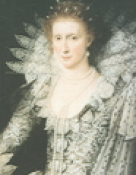The Case for Mary Sidney, Countess of Pembroke

Ben Jonson’s Eulogy (1)
“To the Memory of my Beloved”
Section 1: Title of Jonson’s Eulogy
TO THE MEMORY OF MY BELOVED,
THE AUTHOR,
MR. WILLIAM SHAKESPEARE :
AND
WHAT HE HATH LEFT US.
The title of Jonson’s eulogy, “To the memory of my beloved” not only indicates that the Author had died but moreover that Jonson had a very close relationship with the Author—close enough to openly call her “my beloved.” This is in stark contrast to the way that Jonson had previously mocked and belittled the boorish William Shakspere (whom he would never refer to as "my beloved."). Nor is it likely that Jonson would ever refer to Edward de Vere or Francis Bacon as “my beloved.” This address of “my beloved” also begs the question: if the Author, William Shakspere was beloved to Jonson, and having died in 1616, why did not Jonson—or anyone else for that matter—write a eulogy upon his death (as was customary) or make some note with respect to his passing? Jonson wrote dozens of praise-filled poems to a number of people (who were less than dear to him) but not one to William Shakspere of Stratford upon his death. How could he then refer to such a man as “my beloved”?
Keywords:
my beloved: the use of this term indicates that the Author was dear to Ben Jonson; she was someone for whom he had deep, personal affection—and someone whom he would openly call, ‘my beloved.’ Jonson’s eulogy in praise of the Author is, by some scholars, viewed as being “over-the-top” (or insincere) and not consistent with an objective literary assessment, especially when Jonson claims that the Author is incomparably greater than any other poet and dramatists—of this age or any other age. (And this would certainly be a plausible position if the eulogy were written to William Shakspere of Stratford, whom Jonson has openly mocked in the past). However, we should understand Jonson’s words, not from a purely literary point of view, but in very personal terms: Jonson is saying that no other poet or dramatist can be compared to the Author, in terms of the personal love and admiration he (Jonson) had for her.
The Author: this term refers to the one who has written the plays found in the Folio. Jonson refers to this “Shakespeare” as “The Author, William Shakespeare” to distinguish this person from “the actor, William Shakespeare” who is listed in the Folio as one of the “Principal Actors in all these plays.” (The inclusion of a list of principal actors in the Folio is suspect and may have been part of the overall strategy to divert attention away from the true identity of the Author. The list is entitled, “The Names of the Principall Actors in all these Playes,” which could not be the case since most of the plays in Folio were not previously published nor publicly performed. In addition, the name William Shakespeare heads the list, which is clearly an artificial placement since he—whomever this name refers to—was not a principal actor, but had only had small parts in a few plays. In addition, the inclusion of this out-of-date and misplaced listing of the “Principal Actors” (with “William Shakespeare” heading the list) was meant to give the impression that the plays were written for, and primarily performed upon, the public stage—when, in reality, the plays were originally written for, and performed in front of, a private, aristocratic and/or literary audience.
what he hath left us: Throughout his eulogy, Jonson often treats “what he hath left us,” the body of the Author’s work, as a distinct entity. By this device Jonson is making it very clear that the Author’s work—which bears the name “Shakespeare”—is distinct from the Author herself (who bears another name). To make this distinction more acute Jonson often states that “Shakespeare” (representing the Author’s work—what he hath left us—and not the actual Author) is immortal, whereas other great poets, such as Chaucer and Spenser, are all real people and capable of dying and being buried.
HOME Intro << Previous Next >> 2
